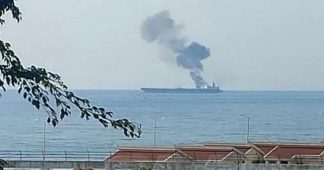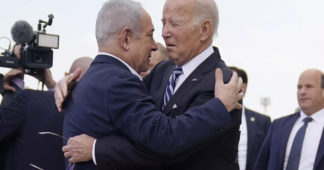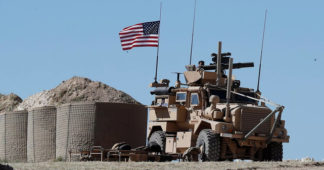Apr. 15, 2024
Iran launched a massive drone and missile barrage into Israel Saturday night targeting military facilities, including an air base hosting jets Tehran says were used in the April 1 attack on the Iranian consulate in Damascus. Iranian and Israeli officials have voiced conflicting narratives about whether Saturday’s attack was a success or failure.
Iran had the legal right under international law and the strategic motivation to mount its overnight strikes against Israel, and the scale of the attack was just a taste of the Islamic Republic’s military capabilities, Tehran-based academics and geopolitical affairs commentators Mohammad Marandi and Foad Izadi have told Sputnik.
“For Iran this was a very small attack. This was just a slap in the face,” Dr. Marandi, a political analyst and professor at Tehran University, said in an interview.
“Iran’s drone and missile capabilities are very advanced, and the Iranians only used a handful of their advanced missiles. The rest were decoys that forced Israelis to use up $1.3 billion worth of anti-missile missiles. So, the Israelis know that if they’ll continue this, then the Iranians will hit them much harder,” the academic said, citing the assessment of Gen. Ram Aminach, a former economic advisor to Israel’s chief of staff, who estimated Sunday that Israel had spent nearly ten times more to shoot down the incoming Iranian missiles and drones than what they cost to manufacture.
“Iran wanted to create a deterrence,” Marandi said, commenting on Tehran’s possible objectives and motivation for the strikes. “The Israeli regime attacked Iran’s sovereignty and murdered Iranian citizens [in the Damascus Embassy attack, ed.]. Iran therefore punished the Israeli regime to make sure that this is never repeated again, especially since the United States, the French and the Germans and the UN Security Council prevented the regime from being condemned or punished.”
“The Iranians felt that they had no option but to punish the [Israeli] regime, and they did so. And the very fact that the Americans want this to end shows that it did not end well for Israel. And if the Israelis continue, then the Iranians will hit much harder,” Marandi warned.
Dr. Izadi, an associate professor in the department of American studies at Tehran University, echoed Marandi’s sentiment that Iran had a right to respond.
“Iran attacked Israel because of Israel’s attack on the Iranian consulate in Damascus. Consulates under international law, under the Vienna Convention are part of that country’s territory, its soil. And under Article 51 of the UN Charter, if a country is attacked, that country can respond, defend itself,” Izadi explained.
Regarding Iran’s motivation and whether it was “a good idea to take this step” and “actually use this right of self-defense,” the professor said that from his assessment of the calculus of Iran’s leadership, the answer is – it was, “because the Israelis have been attacking Iranian sites in Syria and other places for some time.”
“Iranian leaders realize that if they don’t have a serious response, these types of attacks will continue and increase. And that’s why they responded. So, it shows Iran’s capacity. And it shows the fact that Iran is willing to use this capacity,” Dr. Izadi said.
Latest Chapter in Decades-Old Shadow War
Saturday night’s drone and missile barrage was the first-ever Iranian attack on Israeli soil, but only the latest act of a decades-long shadow war between the regional archenemies which has included back-and-forth cyberattack and sabotage operations, the assassinations of Iranian nuclear scientists, and efforts to target one another’s military, intelligence and diplomatic personnel abroad.
Israeli Prime Minister Benjamin Netanyahu warned Sunday that “whoever hurts us” will be “hurt back,” with War Cabinet Minister Benny Gantz saying Israel will retaliate to Iran’s attack in a manner and time “that’s right for us.”
Iranian Armed Forces Chief of Staff Mohammad Bagheri warned Tel Aviv that Saturday night’s operation was just a preview of what would happen if Israel dared respond. “Their population and economic centers were not hit, so that the criminal and aggressive Zionist army would realize that their action won’t remain unanswered,” Bagheri said, warning that Iran could launch an attack “tens of times” as potent in the event of an escalation.
President Biden stated Saturday that he had reaffirmed to Netanyahu in a phone call “America’s ironclad commitment to the security of Israel.” Privately, however, US officials told American media Biden had informed the Israeli leader that Washington would not take part in any offensive action against Iran should Tel Aviv choose to respond.
Iran has a well-established track record of not backing down from the pursuit of its perceived security interests, regularly launching strikes against terror targets in Iraq and Syria, and conducting a similar attack against terrorist and separatist forces in neighboring Pakistan earlier this year. In 2020, Iran responded to the US assassination of IRGC Quds Force Commander Qasem Soleimani by lobbing ballistic missiles at Iraqi bases hosting US troops. In June 2019, Iran shot down a US spy drone which flew into its airspace over the Hormuz Strait, but spared a manned reconnaissance aircraft that was also in the area during the incident to avoid unnecessary escalation.
We remind our readers that publication of articles on our site does not mean that we agree with what is written. Our policy is to publish anything which we consider of interest, so as to assist our readers in forming their opinions. Sometimes we even publish articles with which we totally disagree, since we believe it is important for our readers to be informed on as wide a spectrum of views as possible.











